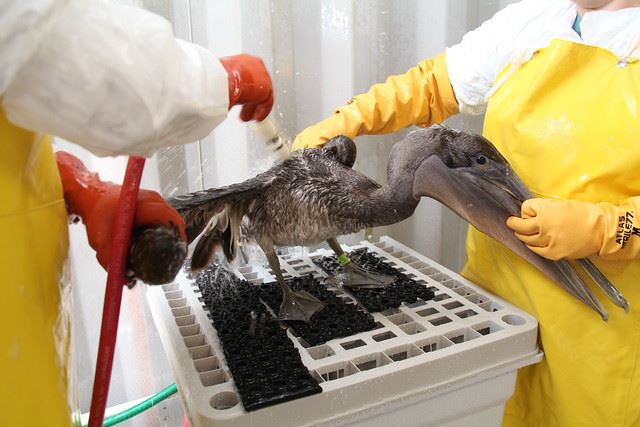 A female brown pelican being rinsed at a rehabilitation centre in Alabama after getting caught in an oil spill. Credit: Tom MacKenzie, USFWS
A female brown pelican being rinsed at a rehabilitation centre in Alabama after getting caught in an oil spill. Credit: Tom MacKenzie, USFWS
Amid climate change and a seemingly endless stream of news about the deterioration of ecosystems throughout the world, there is some hope for marine life and oceans in Canada. The federal government recently invested $ 2.4 million in oil spill research at the Huntsman Marine Science Centre in New Brunswick.
This investment will go towards researching effective responses to oil spills with a focus on the impact of oil spill cleaning measures on aquatic animals.
“Having the best available science is the key to respond effectively to marine incidents, including oil spills. Gaining a better understanding of the effects on our aquatic species will help us make the right decisions when it comes to clean-up measures and keep our oceans and our coasts clean, healthy and safe,” said Jonathan Wilkinson, Minister of Fisheries, Oceans and the Canadian Coast Guard, in a press release.
This investment is part of the Multi-Partner Research Initiative launched by the government in 2016. The goal of this initiative is to support research projects that focus on alternative responses to oil spills, improving our knowledge on how to best contain spills and reduce their environmental impact. Under this initiative, the government will invest $45.5 million over five years for research.
Understanding how to safely clean-up after an oil spill is important because large quantities of oil are lost to the environment each year. In 2018 alone there were approximately 116,000 tonnes of oil spilled around the world, according to a report released by the International Tanker Owners Pollution Federation.
This is problematic because oil spills have detrimental effects on the environment. For example, oil floating on the water can suffocate aquatic plants and influence the buoyancy of marine animals. Chemicals in oil spills can also break down, killing fish and other marine creatures or causing chronic health problems, according to a report about the effects of oil spills on the environment released by the Royal Society of Canada in 2015.
The report also found significant gaps in our knowledge about the influence of oil-spills on vulnerable environments such as the Arctic and recommended more research on the environmental effects of spill response measures.
Currently, there are three main types of response measures to oil spills, including containing and removing the spills, using chemicals to break down or burn the oil, or using natural processes to disperse the oil. The report warned that some cleaning measures such as using chemicals to disperse oil might also have adverse effects on wildlife and the environment, demonstrating the importance of conducting more research in this area.
In a country with a strong reliance on marine ecosystems, improving our prevention and response methods for oil spills is essential. Hopefully, this investment will help fill some critical gaps in our knowledge and enhance the safety and sustainability of aquatic wildlife for years to come.
By: Nicole Babb

Nicole Babb is an aspiring journalist from St. John’s, Newfoundland. She recently graduated from Carleton University with a combined honours degree in journalism and psychology. During her time at Carleton, Nicole wrote articles for the university’s student newspaper and completed a health reporting course which sparked her interest in science journalism and communication. She is passionate about writing and photography, and she also enjoys learning about new scientific research.
Growing up near the ocean, she has always been curious about marine life and she is especially interested in research and reporting concerning the ocean, climate change, and endangered species. In her spare time, Nicole enjoys reading, canoeing, playing basketball and hiking. She also loves animals and spending time with her dog. Nicole is currently residing in Ottawa and she is looking forward to working as a volunteer for Science Writers and Communicators of Canada.
